MAVERICK CITIZEN: LIMPOPO
Dispossessed under apartheid, disempowered in democracy
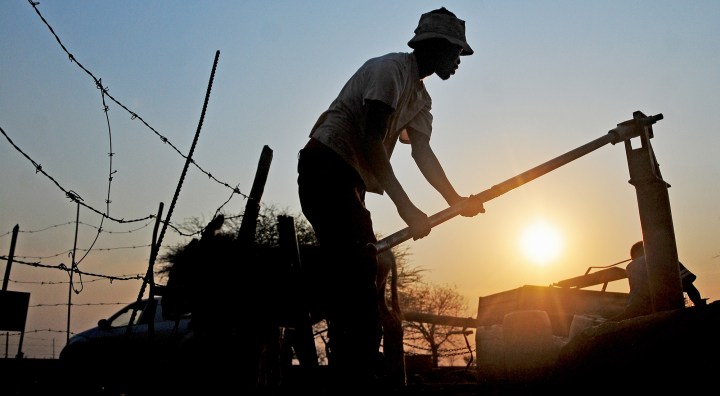
A community living along an international border is heading to court in a bid to get a title deed for the land restored to them 15 years ago.
It’s a swelteringly hot afternoon in the Madimbo Corridor of Limpopo but a group of elders ascend a rugged hill with much enthusiasm.
A wide-open pit about 10m below leads to a gaping, somewhat eerie hole that leads into a dark tunnel disappearing deep into the earth.
“We want our people to come and work here. We have too many minerals here but our people are poor,” says one of the elders, Mawasane Mudzweda, his eyes scanning the depth of the pit as he stands leaning against holding onto a tree trunk.
Down below, dull, dry vegetation clings onto rocky hills alongside giant baobabs whose dry branches rise into the hot sky like tentacles of creatures from dinosaurs times.
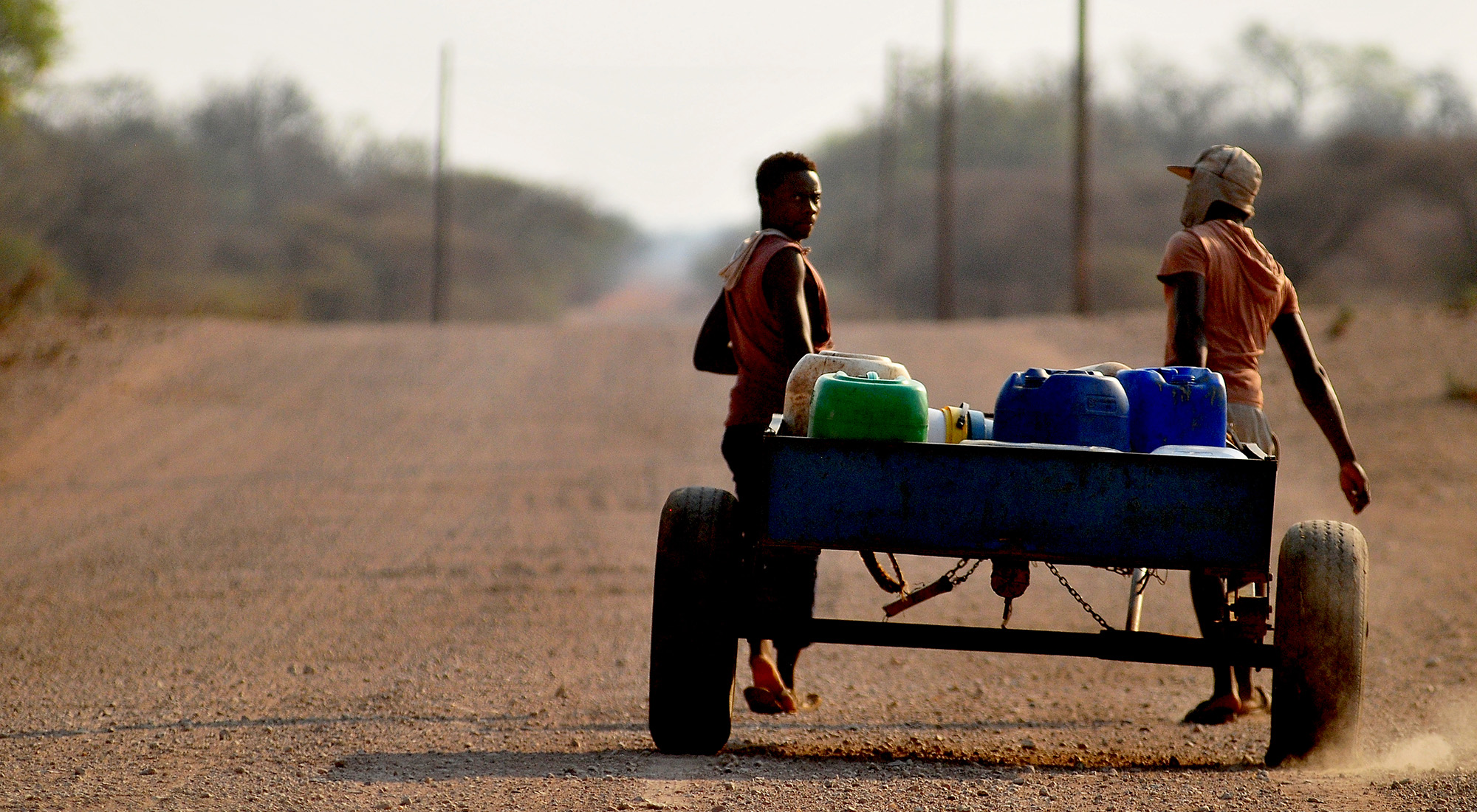
Youths pull a cart to draw water from a communal tap in Gumbu, one of the villages in the Madimbo Corridor. The area suffers an acute shortage of water and has a high unemployment rate. Photo: Lucas Ledwaba/Mukurukuru Media
The open-pit is what remains of a graphite mine which was forced to close down in the latter part of the 1970s due to the Zimbabwean war of liberation raging just under 5km away across the Limpopo river.
It lies on land once inhabited by communities that have now organised themselves under the Vhembe Communal Property Association which has been fighting to get back control of this land from government departments leasing it to the SA National Defence Force (SANDF).
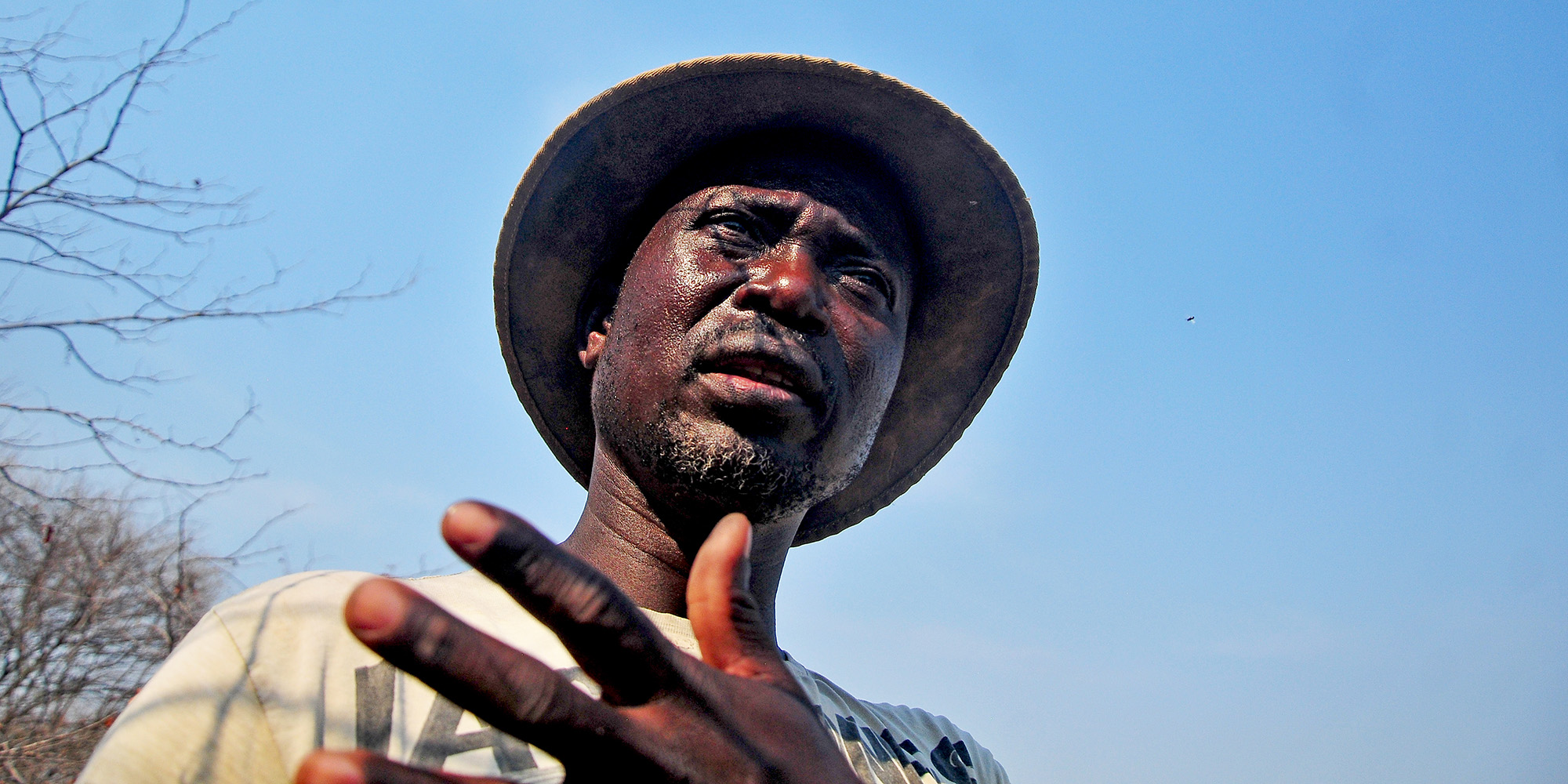
Muthivhelo Mackson Mmengeni of the Mutele Traditional Authority says they want the old graphite mine which was forced to close during the Zimbabwean war of liberation to be reopened so people in the Madimbo area can have jobs. Photo: Lucas Ledwaba/Mukurukuru Media
The land is sandwiched between the far northern border of the Kruger National Park in the east and the international border with Zimbabwe in the north.
In 1996, the Vhembe CPA, on behalf of the Mutele and Tshikundamalema communities lodged a claim on 27,000ha of the land in line with the Restitution of Land Rights Act 22 of 1994 – after a series of forced removals dating back to the 1930s right into the early 1980s.
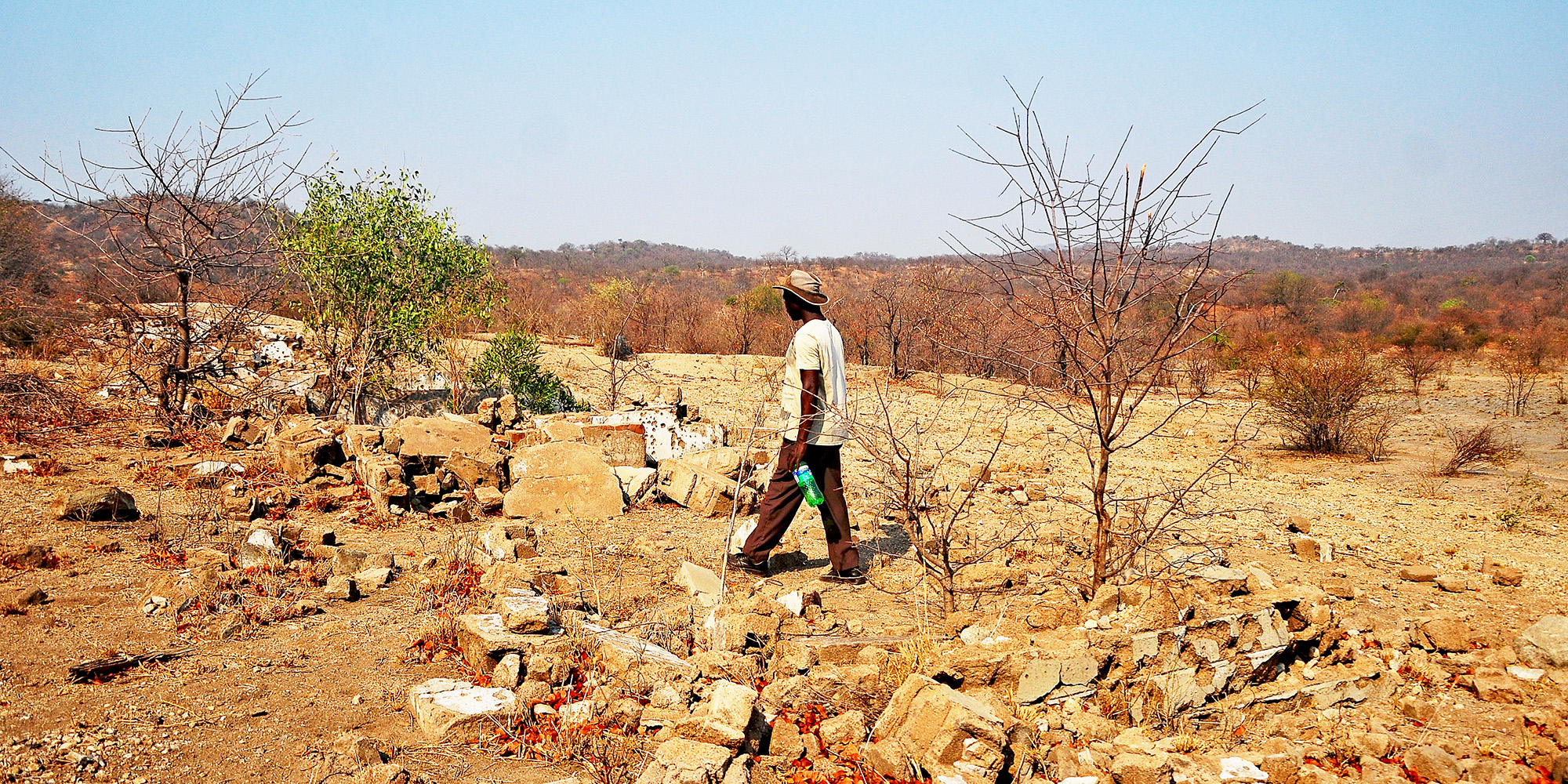
Muthivhelo Mackson Mmengeni walks through the ruins of what used to be the workers’ quarters at a graphite mine in Gumbu/Madimbo. Residents want to be granted a title deed to their land so they can proceed with plans to reopen the mine. Photo: Lucas Ledwaba/Mukurukuru Media
In 1968 the SA military occupied part of the land along the Limpopo river to counter the threat of anti-apartheid guerrillas using the area to infiltrate into the country. Later on, the military also began using the area as a training zone.
The communities removed from the fertile areas along the Limpopo river where they had lived off the land for generations, were relocated further inland to barren villages where ploughing is almost impossible especially outside the rainy season.
“People have always wanted to return to their land because it’s closer to the river. They were ploughing and living off the land. There was plenty of water there and people didn’t lack food,” explains Mudzweda, chairperson of the Vhembe CPA.

One of many baobab trees that grow in the Gumbu/Madimbo area which is subject of a 15 year dispute between the community, the SANDF and the Department of Rural Development and Land Reform. Photo: Lucas Ledwaba/Mukurukuru Media
In 2004 after a string of protests by the community the Commission on Restitution of Land Rights (CRLR) finalised the community’s land claim. Yet still, the community could not return to their land.
The Department of Public Works which “is currently the lawful owner of the Madimbo Corridor” proposed that the SANDF remain on 16 000 hectares of the land under a 99-year lease. But the Vhembe CPA rejected the deal, and instead, they proposed a five-year lease deal on 10,000 hectares of land and that it should not be used for training purposes by the military.
Residents of villages alongside the military claim the explosion of weaponry at the base during training exercises traumatises young and old and has led to cracks in the walls of houses. There are also two reported casualties of residents who were killed when they picked up active bombs near the base.
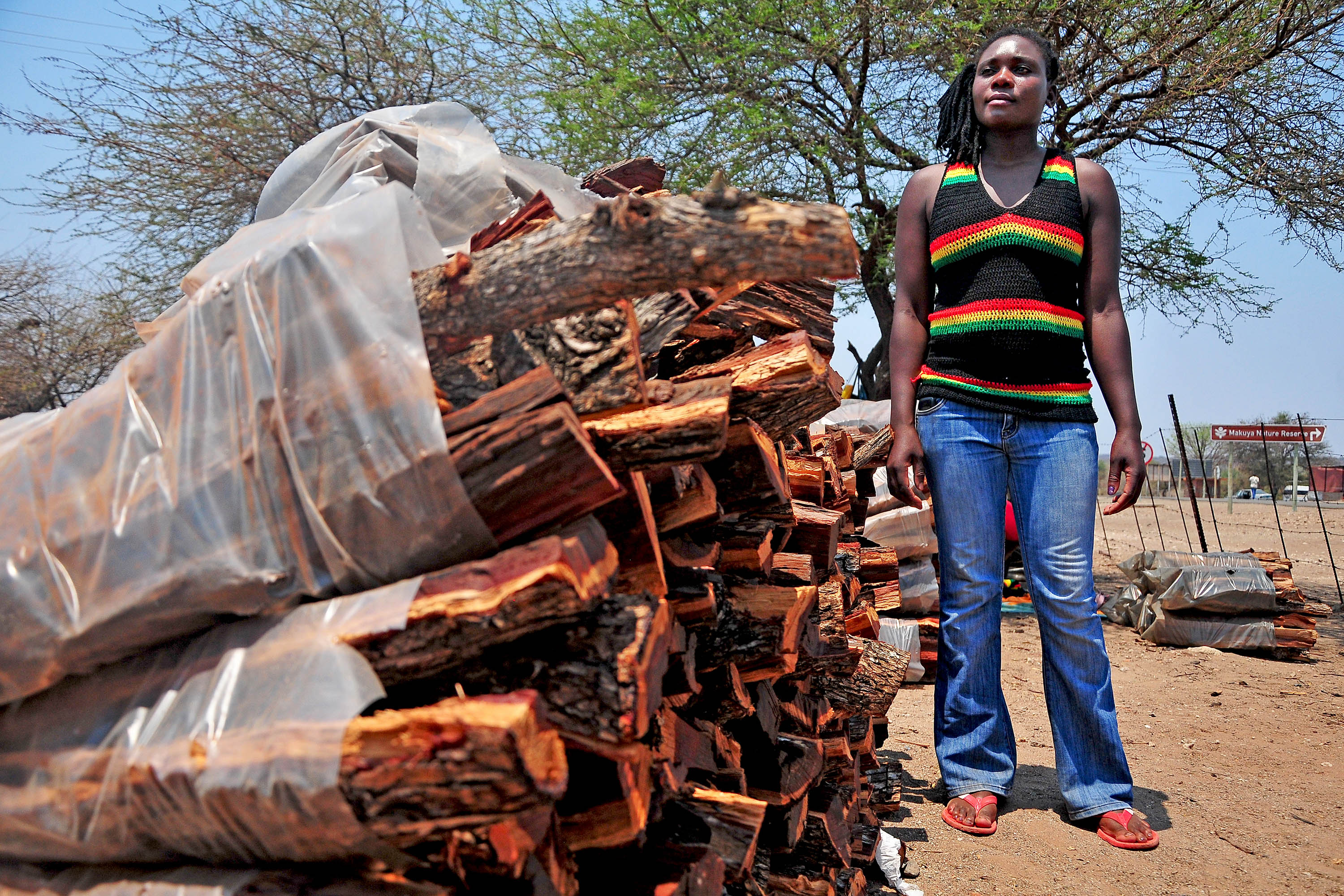
Morongwa Baloi is among a group of residents who sell firewood along the main road from Tshipise to the Kruger National Park. She says life’s hard and among her wishes is that an old mine in the area should be reopened to create jobs for locals who are in the midst of a long-ranging dispute over the finalisation of their land claim. Photo: Lucas Ledwaba/Mukurukuru Media
Siaga Mbangiseni, a resident of Gumbu village points to a crack in the wall of her one-room brick house as evidence of the damage caused during the military exercises at the base about 4km away.
“The bombs are going off all the time. We are scared because the earth shakes so much. Even children cry,” Mbangiseni says.
The deadlock over the terms of the lease agreement has led to a delay in the issuing of a title deed to the Vhembe CPA.
This has had dire consequences in this area where the only few jobs available are mostly on the white-owned commercial farms in the Tshipise area about 50km away. The situation has been exacerbated by the closure of the Tshikondeni Coal mine in 2014, which was one of the major employers in the area over many years.
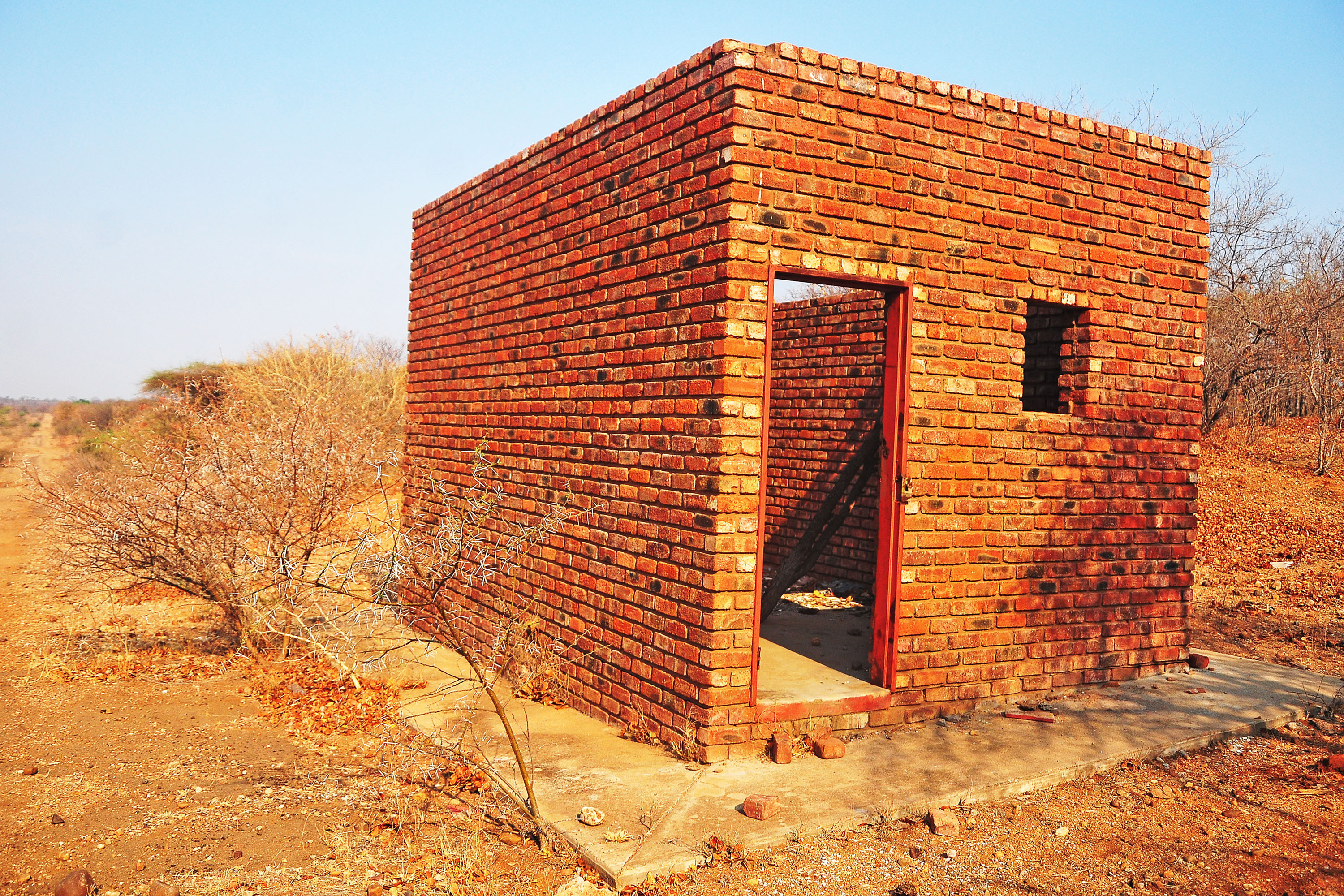
A guardhouse previously used by conservation officials along the Madimbo corridor has been abandoned as a result of the land claim which was awarded to the community in 2004. Photo: Lucas Ledwaba/Mukurukuru Media
“We were brought up with earnings from that mine,” cries Morongwa Baloi, a firewood vendor along the R579 in Masisi, a village near the Pafuri Gate of the Kruger National Park.
Together with a group of men and women from Masisi and surrounding villages, they camp by the roadside daily to make a sale to tourists heading to the national park. But competition is tough and sellers sometimes go for days, weeks even without a single sale.
To compound their problems, they have to dribble past soldiers that patrol the border and elephant that roam the land in order to get quality wood deep in the bush towards the Limpopo river.
Baloi shares the views of her fellow wood traders that jobs there would lead to less suffering and more jobs should the old graphite mine and the Tshikondeni mine be reopened.
Muthivhelo Mackson Mmengeni of the Mutele Traditional Council says the area is rich in minerals and they want to exploit these in order to create more jobs. But the prevailing situation is making this impossible.
“There is so much poverty here. But when you look at our land, we are very rich in minerals, graphite, coal. We want these mines to be reopened,” he says after walking through the ruins of what used to be old mine worker dormitories.
Mudzweda adds: “We cannot work our land. When investors come here they want a title deed. You can’t lease out land when you don’t have a title deed.”
The community through the CPA has endorsed a proposed mining prospecting application by the SAMIN Group Pty (Ltd) which they say will lead to proper land use planning.
But the Limpopo Department of Economic Development, Environment and Tourism (Ledet) has allegedly turned down the application to conduct mining prospecting on the basis that the area in question forms part of the Matshakatini Nature Reserve which was gazetted in January 1992.
The Vhembe CPA says the declaration of the reserve was done hastily towards the last days of apartheid without consultation of the community. They also argue that the reserve doesn’t exist in practical terms, because it’s not demarcated and the said area includes homesteads, grazing and agricultural land.
“That reserve only exists in the heads of some people. There is no such a reserve. No one can show you this so-called reserve. This was just the work of some white farmers who wanted to steal our land just before the end of apartheid,” argues Mudzweda.
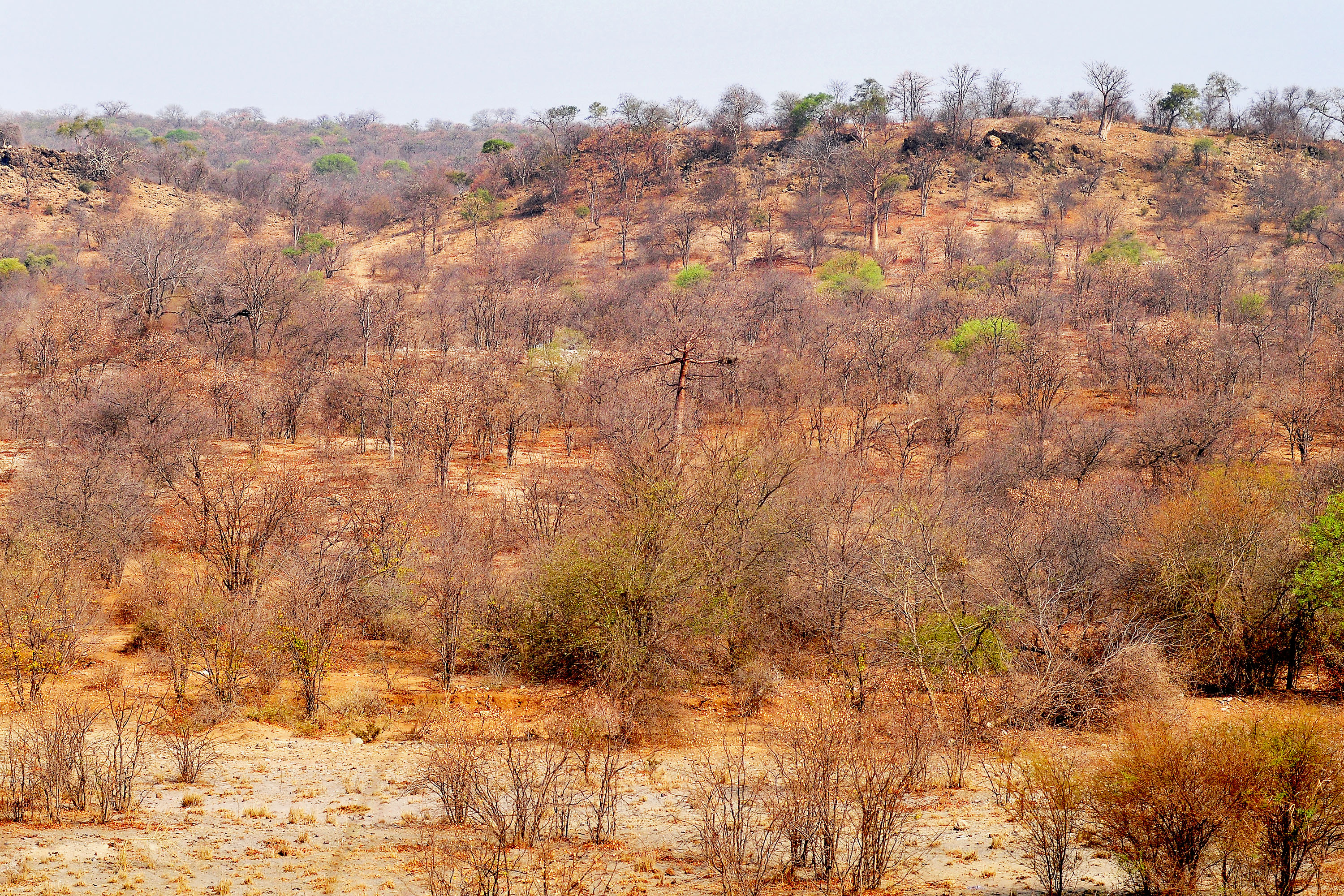
Members of the Vhembe Communal Property Association which represents communities that claimed land in the Madimbo Corridor want government to speed up the handing over of a title deed to their land. Photo: Lucas Ledwaba/Mukurukuru Media
Last month members of the community protested on the N1 highway to Musina in a bid to bring the matter to the attention of the authorities.
The Vhembe CPA has now petitioned the Limpopo Provincial Legislature asking it to force Ledet to de-proclaim the Matshakatini Game Reserve. They have also sent a memorandum to the office of premier Chupu Mathabatha asking him to intervene in the matter.
“As it stands, there are no nature reserve activities taking place, the area is not fenced, people are conducting illegal hunting, poaching and cutting of trees due to alarming poverty levels in the communities,” the CPA says in its petition to the legislature.
Zaid Kalla, spokesperson for Ledet says in September the office of the national Minister of Environmental Affairs, Forestry and Fisheries “made a finding regarding the appeal to the fact that Matshakatini Nature Reserve may not be de-proclaimed /withdrawn and the communities were given an opportunity to approach the court to review the findings of the minister should they wish to do so.”
He says the department would refrain from further comments on the matter until such time the Limpopo legislature pronounces on the matter.
The Department of Public Works did not respond to enquiries on the matter to answer whether they are open to further engagements with the community regarding the lease agreement. The Department of Agriculture, Land Reform and Rural Development did not respond to enquiries on why they have not issued a title deed to the community.
Mudzweda says their next step is to approach the courts.
“We are a poor community. We have dealt with so many ministers and departments over so many years. We are tired. We want to own our land and to use it to end poverty,” he says. MC
Lucas Ledwaba is the Editor of Mukurukuru Media and writes for Maverick Citizen




















 Become an Insider
Become an Insider